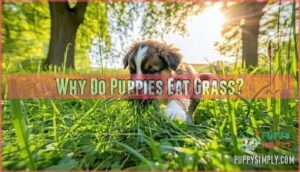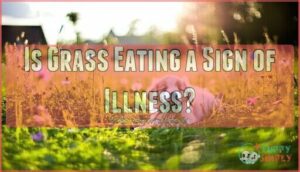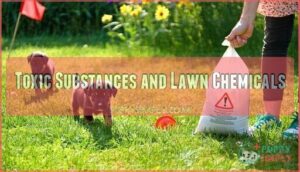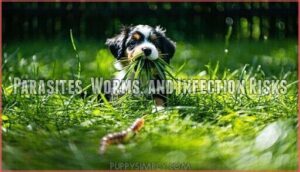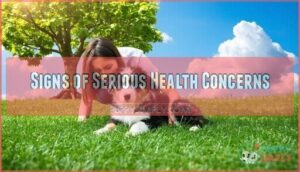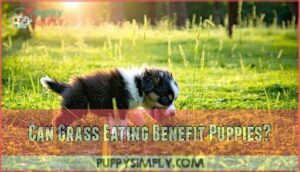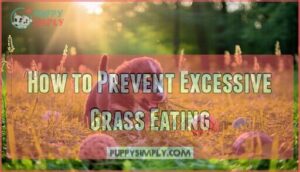This site is supported by our readers. We may earn a commission, at no cost to you, if you purchase through links.
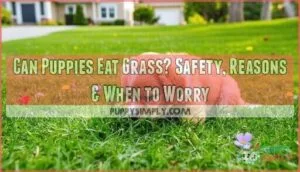
While grass itself isn’t poisonous, the real concerns lie in what’s on that grass: fertilizers, pesticides, and parasites can all pose risks to your puppy’s developing system.
Understanding why puppies graze, when it’s harmless exploration versus a red flag, and how to keep your pup safe outdoors will help you navigate this peculiar habit with confidence.
Table Of Contents
- Key Takeaways
- Can Puppies Eat Grass Safely?
- Why Do Puppies Eat Grass?
- Is Grass Eating a Sign of Illness?
- Health Risks Associated With Grass Eating
- Can Grass Eating Benefit Puppies?
- How to Prevent Excessive Grass Eating
- When Should You Call The Vet?
- Frequently Asked Questions (FAQs)
- Is it okay for my 8 week old puppy to eat grass?
- Is grass safe for puppies to eat?
- At what age can puppies go on grass?
- What happens when my puppy eats grass?
- Can dogs eat grass?
- Can a dog eat grass and vomit?
- How do I get my Dog to eat a lot of grass?
- Can dogs eat grass if wormed?
- Should I let my puppy eat grass?
- Can 8 week old puppies eat grass?
- Conclusion
Key Takeaways
- Grass itself isn’t toxic to puppies, but the real danger comes from what’s on it—fertilizers, pesticides, and parasites can cause serious health problems, so always supervise outdoor time and avoid chemically treated lawns.
- Most puppies eat grass out of curiosity, boredom, or ancient instinct rather than illness, with studies showing fewer than 10% appear sick beforehand and less than 25% vomit afterward, making it generally harmless behavior.
- While occasional grass munching is normal, you should call your vet if your puppy shows persistent vomiting, bloody diarrhea, obsessive grass eating, lethargy, or sudden appetite changes—these signal potential nutritional deficiencies, parasites, or gastrointestinal issues.
- You can reduce excessive grass eating by increasing fiber in your puppy’s diet, providing more mental stimulation and exercise to combat boredom, and using positive training techniques like the "leave it" command during supervised outdoor play.
Can Puppies Eat Grass Safely?
You’ve probably caught your puppy munching on grass and wondered if it’s safe. The good news is that grass itself isn’t toxic to puppies, though there are a few important things you should know.
Let’s look at whether grass poses any real danger and why this behavior is so common in young dogs.
Is Grass Toxic or Dangerous for Puppies?
Grass itself isn’t toxic to puppies, but what’s on the grass can be. Lawn chemicals, pesticides, and herbicides pose real risks to your puppy’s gastrointestinal health. Watch for these toxic substances:
- Fertilizers – Can cause digestive issues and toxic ingestion
- Weed killers – Often contain harmful chemicals that affect puppy safety
- Toxic plants – Some ornamentals mixed in lawns are dangerous
If you’re unsure about grass toxicity or notice symptoms, seek veterinary advice promptly.
Commonality of Grass Eating in Young Dogs
If you’re worried about chemicals on the lawn, you might wonder how common this behavior actually is—and the short answer is very common, especially in puppies. Young dog habits include exploring the world through their mouths, and eating grass is just part of that natural curiosity.
Veterinarians encounter this puppy behavior daily. Studies show most dogs eat grass at some point, driven by canine instincts rather than dietary influences or nutritional gaps.
Why Do Puppies Eat Grass?
If you’ve caught your puppy munching on grass during your backyard adventures, you’re probably wondering what’s behind this quirky behavior. The reasons puppies eat grass can range from simple curiosity to deeper instincts passed down through generations.
Let’s explore the most common explanations for why your little one might be grazing like a tiny lawn mower.
Taste, Texture, and Curiosity
Puppies explore the world with their mouths, and that includes sampling the green buffet in your backyard—often out of simple curiosity about taste and texture. This sensory exploration is perfectly normal canine behavior.
Many dogs eat grass simply because they enjoy the flavor profiles or texture variety it offers. Some puppies develop grass preferences for specific types—perhaps favoring tender spring shoots over coarser blades.
Why dogs eat grass isn’t always complicated; sometimes eating grass is just an appealing snack during their daily adventures.
Boredom and Behavioral Causes
When the novelty of tasting grass wears off, you might notice your puppy still munching on the lawn—and in these cases, boredom or under-stimulation could be the real culprit behind the behavior. Puppies need mental stimulation and physical activity to stay engaged, and without it, they’ll create their own entertainment—often through repetitive canine behavior like grass grazing.
Common boredom triggers include:
- Insufficient exercise or playtime leaving excess energy unspent
- Lack of interactive toys or canine enrichment activities
- Limited social interaction with people or other dogs
- Monotonous routines without variety or mental challenges
Addressing behavioral issues through play therapy and increased engagement often reduces this dog behavior and health concern naturally.
Instinctual and Evolutionary Reasons
Beyond simple curiosity, your puppy’s grass-eating habit may trace back thousands of years to their wolf ancestors and other wild canids. Studies show that wild canid behavior includes regular plant consumption, with wolves displaying 2-10% plant material in stomach contents—an evolutionary trait linked to natural foraging and gut health benefits.
This instinctive behavior likely helped ancestral populations manage intestinal parasites and maintain digestive function. Modern canine behavior and psychology still reflect these animal instincts, suggesting grass eating fulfills deeper biological purposes rooted in their ancestral diet.
Understanding the nutrient deficiency factors can provide insights into why puppies engage in grass-eating behaviors.
Is Grass Eating a Sign of Illness?
Most puppies who munch on grass aren’t signaling a health crisis—they’re just being dogs.
But sometimes, that grazing habit does point to something worth watching. Let’s look at when grass eating might actually mean your puppy isn’t feeling their best.
Stomach Upset and Digestion
Many pet owners wonder if their puppy’s grass munching means something’s wrong with their stomach, but the connection isn’t as clear-cut as you might think. Research shows fewer than 10% of dogs appear sick before eating grass, and less than 25% vomit afterward. Here’s what the evidence tells us:
- Grass isn’t a reliable cure – Most puppies don’t vomit after grazing, suggesting it’s not primarily self-medication for stomach problems.
- Digestive issues rarely drive the behavior – Puppies on balanced diets shouldn’t have gastrointestinal health problems requiring extra fiber intake.
- Gut flora and gut health – While some believe grass aids digestion, there’s little proof it meaningfully resolves digestive problems or stomachache.
Nutritional Deficiencies and Pica
Pica—the tendency to eat non-food items—ranks as the third most common behavioral problem in dogs and affects puppies more than adults. Studies link grass consumption to deficiencies in iron, calcium, zinc, and several B vitamins. While dogs on balanced diets shouldn’t lack these nutrients, pica cases are highest in dogs under one year old.
If your puppy’s grass eating seems obsessive or paired with other symptoms, a vet can assess whether nutritional deficiency or underlying health issues are at play. Understanding common pica causes is essential for addressing the behavior effectively.
When Grass Eating Indicates Health Issues
Most grass-eating is harmless, but certain red flags should send you straight to your vet’s office. Watch for these gastrointestinal signs that signal something more serious than curiosity:
- Persistent vomiting or diarrhea after grass consumption
- Blood in stool or vomit, indicating intestinal issues
- Lethargy, abdominal pain, or loss of appetite—classic stomach problems
- Obsessive grass consumption paired with weight loss, suggesting dietary imbalances
These symptoms can point to gastrointestinal issues requiring immediate attention for your puppy’s digestive health.
Health Risks Associated With Grass Eating
While grass itself isn’t usually harmful, what’s on or in it can pose real risks to your puppy. From lawn chemicals to hidden parasites, there are several hazards worth knowing about.
Let’s look at the main concerns you should watch for.
Toxic Substances and Lawn Chemicals
While grass itself isn’t inherently harmful, the chemicals we use to keep our lawns flawless can turn an innocent nibble into a serious health hazard for your puppy. Fertilizers, herbicides, and pesticides can contain poisonous substances that cause anything from mild stomach upset to serious toxicity.
Even well-meaning neighbors might spray lawn chemicals you’re unaware of. Keep your puppy away from treated lawns and always supervise outdoor time, especially in unfamiliar yards where toxic plants or substances may lurk.
Parasites, Worms, and Infection Risks
Grassed areas carry hidden dangers you can’t always see. When your puppy munches grass, they risk ingesting parasites and intestinal worms from fecal contamination left by other animals. This isn’t just speculation—studies show over half of urban dog parks contain hookworm eggs.
Here’s what lurks in that innocent-looking lawn:
- Roundworms, hookworms, and whipworms cause malnutrition and stunted growth in puppies
- Lungworm spreads through slugs and snails hiding in grass
- Zoonotic diseases can transfer from your puppy to you
- Intestinal blockage may occur with severe parasite loads
Puppies face higher risks than adult dogs due to weaker immunity. Regular veterinary advice includes monthly deworming and supervision during outdoor play to protect your growing pup from these hidden threats.
Signs of Serious Health Concerns
Your puppy might munch grass occasionally without issue, but certain symptoms demand immediate veterinary attention. Watch for repeated vomiting, bloody diarrhea, lethargy, or loss of appetite—these emergency symptoms signal serious digestive problems or parasite infections.
Abdominal pain, excessive drooling, or obsessive grass eating may indicate stomach issues requiring professional assessment.
Vomiting causes in puppies range from minor digestive issues to life-threatening intestinal parasites affecting gastrointestinal health in dogs, so trust your instincts and call your vet when dog health concerns arise.
Can Grass Eating Benefit Puppies?
While grass munching might seem like an odd habit, it’s not all downside for your puppy.
In some cases, nibbling on grass can actually serve a purpose beyond simple curiosity.
Let’s look at a few potential benefits that might explain why this behavior has stuck around through generations of dogs.
Fiber and Digestive Health
One of the fiber benefits you mightn’t have considered is how grass affects your puppy’s gastrointestinal tract. While puppies can’t fully digest plant cellulose, grass still offers some advantages for digestive health:
- Increased gut motility – Fiber stimulates bowel movements and helps maintain regularity
- Gut microbiome support – Fermentable fiber feeds beneficial bacteria that produce health-promoting compounds
- Improved stool quality – Adequate fiber intake helps form well-formed stools and bolsters gastrointestinal health in dogs
Though grass itself provides minimal nutrition, its fiber content can still influence your puppy’s digestive system positively when consumed occasionally.
Self-Soothing and Calming Effects
Beyond supporting digestion, grass may also serve as a natural stress reliever for some puppies. The repetitive chewing action can act as a calming technique, offering emotional support during moments of anxiety or boredom.
This self-soothing behavior mirrors how some dogs engage in other relaxation methods when feeling unsettled. While dog eating grass doesn’t replace proper anxiety reduction strategies, it may provide temporary stress relief through this innate canine behavior and nutrition response.
Evolutionary Advantages
When you look at the bigger picture, this seemingly quirky habit actually has roots in your puppy’s ancestral past. Wild ancestors relied on natural foraging to supplement their primitive diet, making grass eating an instinctual behavior shaped by adaptive traits:
- Scavenging plant matter alongside prey provided essential fiber
- Purging intestinal parasites through roughage consumption
- Supplementing nutrients when meat was scarce
- Maintaining digestive health through varied food sources
- Responding to animal instincts that persist in modern canine behavior and nutrition
This evolutionary context explains why dogs eating grass remains common despite domestication.
How to Prevent Excessive Grass Eating
If your puppy can’t seem to pass a patch of grass without snacking, you’re not alone in wanting to curb the habit. While occasional grazing is harmless, excessive grass eating calls for a thoughtful approach.
Let’s look at three practical strategies that can help redirect your puppy’s attention away from the lawn.
Dietary Changes and High-Fiber Foods
Switching to a high-fiber diet might be the simplest solution if your puppy treats the lawn like an all-you-can-eat salad bar. Dogs with nutritional deficiencies sometimes seek out fiber through grass, so dietary adjustments can make a real difference.
Consider these high-fiber options:
| Food Type | Fiber Benefits |
|---|---|
| Pumpkin puree | Aids digestive health naturally |
| Sweet potatoes | Balances nutrient needs effectively |
| Green beans | Adds bulk without excess calories |
| Oat bran | Promotes healthy gut function |
| Commercial high-fiber kibble | Provides complete nutrition with added fiber |
Talk with your vet about fiber supplements or switching foods to support your puppy’s dog nutrition and health while maintaining proper nutrient balance.
Increasing Play, Exercise, and Mental Stimulation
Bored puppies turn backyards into buffets, so ramping up daily activity often curbs their grass-munching habit before it becomes routine.
Playful outdoor activities like fetch or agility exercises burn energy, while mental stimulation games—puzzle feeders, scent work, or hide-and-seek—keep minds sharp.
Interactive toy options offer physical activity benefits that tackle boredom head-on, improving overall dog behavior and health naturally.
Training, Deterrents, and Supervision
Teaching your puppy the "leave it" command gives you real control when those curious jaws head straight for the lawn. Consistent training sessions—where you reward your pup with treats or praise for ignoring grass—build reliable obedience that carries into everyday situations.
Supervision during outdoor time lets you redirect attention immediately, while bitter-tasting sprays on select grass patches act as natural deterrents that discourage repeat offenders without harsh measures.
Leash control during walks and supervised play in safe yard areas help you manage what goes into your puppy’s mouth. Positive reinforcement and reward training strengthen the bond while preventing dogs from eating grass becomes second nature—simple barriers or designated play zones make dog training easier when you’re actively working on impulse control.
When Should You Call The Vet?
Most puppies who nibble grass now and then don’t need a vet visit. But certain warning signs shouldn’t be ignored.
Here are three situations that warrant a call to your veterinarian.
Persistent Vomiting or Diarrhea
If your puppy vomits more than once after eating grass or develops diarrhea that lasts beyond a day, it’s time to pick up the phone and call your veterinarian. These gastrointestinal issues signal something more serious than routine grass eating.
Persistent vomiting causes dehydration quickly in puppies, while ongoing diarrhea can indicate intestinal parasites or other digestive health problems. This requires professional diarrhea treatment and evaluation of your puppy’s overall dog health and wellness.
Excessive or Obsessive Grass Eating
Your puppy nibbling grass occasionally might seem harmless enough, but when that behavior shifts into a full-blown obsession—constantly grazing, fixating on every blade, or refusing to focus on anything else during walks—you’re looking at a red flag worth investigating.
This compulsive eating pattern could point to canine anxiety, underlying gastrointestinal discomfort, or nutritional gaps that need professional attention. When your dog eats grass excessively despite redirection, schedule a veterinary exam to rule out medical causes behind this obsessive behavior.
Sudden Changes in Behavior or Appetite
A sudden nose-to-tail shift—your once-ravenous puppy turning away from meals, sleeping through play sessions, or starting to graze on grass like it’s a newfound obsession—often signals that something deeper than boredom is at work.
These appetite shifts and behavioral alerts, especially when paired with sudden vomiting or food aversions, suggest stomach sensitivity or underlying dog health concerns.
Don’t wait if your puppy’s eating habits flip overnight—contact your vet promptly.
Frequently Asked Questions (FAQs)
Is it okay for my 8 week old puppy to eat grass?
It’s perfectly normal for your 8-week-old puppy to nibble on grass occasionally. Most puppies eating grass do so out of curiosity or instinct, and grass itself isn’t toxic to dogs.
Is grass safe for puppies to eat?
Typically, grass itself isn’t toxic to puppies. The main concern is what’s on the grass—herbicides, pesticides, or fertilizers can pose serious health risks.
Dogs eat grass for various reasons, from boredom to instinct, so supervise outdoor time carefully.
At what age can puppies go on grass?
Picture tiny paws touching dew-kissed blades for the first time. Most puppies can safely explore grass around 16 weeks old, after completing their core vaccinations.
This timing protects against parvovirus and other diseases lurking in outdoor spaces, ensuring proper puppy development and safe outdoor introduction.
What happens when my puppy eats grass?
Most puppies simply digest the grass without incident. Occasionally, they may vomit or pass it in their stool.
Less than 25% of dogs eating grass experience vomiting afterward, so it’s generally harmless behavior.
Can dogs eat grass?
Long story short, yes—dogs eat grass, and it’s perfectly normal. Most veterinarians see this daily.
While the exact reason remains unclear, grass eating is a natural canine behavior rooted in dog instincts, not usually a red flag.
Can a dog eat grass and vomit?
Yes, dogs eat grass and vomit occasionally, but it’s less common than you’d think.
Studies show fewer than 25% of dogs vomit after eating grass, suggesting stomach upset isn’t the main reason for this behavior.
How do I get my Dog to eat a lot of grass?
Like trying to teach a cat to love water, encouraging your dog to eat a lot of grass isn’t recommended.
Grass eating is natural, but excessive consumption can expose your pet to lawn chemicals, parasites, or indicate underlying health issues.
Focus instead on understanding why dogs eat grass and ensuring their canine health through proper nutrition and vet-approved care.
Can dogs eat grass if wormed?
Regular worming doesn’t stop dogs from eating grass, but it does reduce parasite control risks like intestinal parasites and lungworm. If your dog eats grass frequently, consistent parasite prevention remains essential.
Healthy grazing poses minimal concerns when combined with veterinary advice and proper canine digestion support.
Should I let my puppy eat grass?
If your dog eats grass occasionally, there’s usually no need to intervene—it’s often harmless exploration.
However, supervise outdoor time to guarantee lawn safety, watch for eating grass excessively, and prevent ingestion of toxic chemicals that could compromise digestive health.
Can 8 week old puppies eat grass?
Eight-week-old puppies can safely nibble grass, though lawn safety matters—avoid areas treated with chemicals.
At this stage of puppy development, curiosity drives exploration. Monitor for eating grass excessively, which may signal digestive health concerns requiring veterinary advice and guidance.
Conclusion
So can puppies eat grass? Most of the time, it’s harmless curiosity or a quirky snack preference, but vigilance matters. Keep your lawn free of chemicals, monitor frequency and volume, and watch for signs of distress.
If grass eating becomes obsessive or paired with vomiting, lethargy, or appetite loss, your vet can rule out underlying issues. With a balanced diet, plenty of enrichment, and safe outdoor spaces, you’ll help your puppy explore the world without unnecessary risk.

